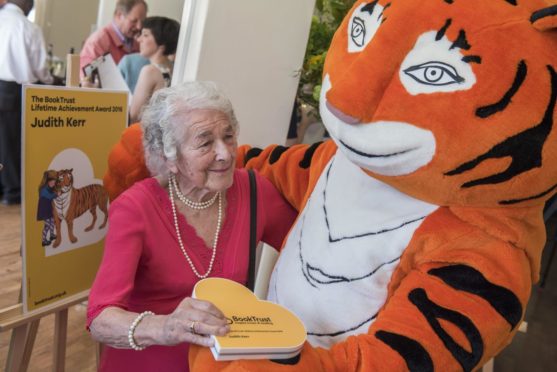In a lovely interview in 2015 between Newsnight’s Emily Maitlis and the late children’s author Judith Kerr, Maitlis admits – slightly shamefacedly – that repeatedly reading Kerr’s famous picture book, The Tiger Who Came To Tea, to her daughter made her wonder if it was about sexual awakening.
Kerr laughed gently, used to the theorising, examples of which still proliferate online. “I just couldn’t identify with a tiger coming to tea,” is one baffling website contribution. (Well, try imagination, friend.)
But epiphany! They then realised it was about immigration and foreigners gobbling up Blighty’s resources. (Please – not THAT much imagination.)
Kerr solved the mystery. It wasn’t about sex, or incomers, or the Nazis. It was about a tiger coming to tea. Who knew?
The tale of Sophie and her mummy answering the doorbell to find a tiger politely asking if he could have something to eat, is one that, like Maitlis, I read to my children.
They adored the tale of the hungry tiger who eats every single thing in the house and drinks all the milk.
But now, Scottish charity Zero Tolerance has condemned the book for encouraging gender stereotypes, potentially leading to rape.
Well, that went downhill fast. You start with a tiger eating a few iced buns and you end with sexual violence.
It would be fair to say I am an out-and-proud feminist. I often write in this column about injustices to women around the world because I think it matters.
Despite legislation and social changes, discrimination against women is still tolerated and even encouraged. And yes, some of it is subtle and starts in childhood, and so, what we tell children is important.
But am I outraged by The Tiger Who Came to Tea? Of course I’m not. Partly because I have a sense of humour but mainly because I haven’t had a frontal lobotomy that accidentally removed all my common sense.
This charming… tiger
Zero Tolerance’s objections centre round Sophie being at home with mummy, not daddy. (Is that a gender crime now?) Worse, it’s daddy who suggests going to a café for tea because there’s nothing left in the house.
The story was written in the 1960s and unless we are going to completely rewrite history, or have a Nazi-style book-burning ceremony, we’d better find a way of dealing with classic stories that illustrate a different world.
Like talking to children about that world. Or even saying, “It must have been mummy’s day off that day.” (And while we’re on the subject, is the use of ‘mummy’ and ‘daddy’ part of an upper class stranglehold of societal power and indicative of suppression of working class values? Anyone?)
I could understand the objection if Sophie and her mother ran screaming to daddy and hid behind his back while he heroically speared a sword through the tiger’s chest and then brought mummy round with smelling salts.
The fact is that Sophie and her mother confidently welcome the supposed aggressor into their midst. Kerr’s illustrations are delightful, with Sophie cuddling the tiger and playing with his tail.
The tiger is totally charming, quite the politest tiger you have ever met who says please and thank you for every morsel. He’s just a bit hungry.
Zero Tolerance points out that he’s male, and not female or gender neutral. So, in the surreal tale of a talking tiger who rings a suburban door bell, comes in for tea and wins the award for best mannered tiger in history, the most difficult bit to swallow is that he doesn’t preface lunch with, “By the way, my pronouns are they/them? If you would be so kind…”
Meanwhile, back in the real world, Channel 4 have announced that John Cleese will host a new show about the “woke” generation and the way they are trying, “to rewrite the rules on what can and can’t be said”.
The most disturbing thing about the phenomenon is that the worst examples often come from those clinging to the lifebuoy of political correctness without understanding any of the nuances – which is why they have to repeat it parrot fashion with faux outrage.
I’ll be honest. Finding myself agreeing with anything the ranting John Cleese says is a bit like the moment you discover your first grey hair: horrifying.
But I really couldn’t argue when he said in an interview this week that “words depend on their context. Very literal-minded people think a word is a word but it isn’t”.
Quite. So I’ll choose my final word on Zero Tolerance and gender-neutral tigers very carefully with due regard for context: ridiculous.
Catherine Deveney is an award-winning investigative journalist, novelist and television presenter.

